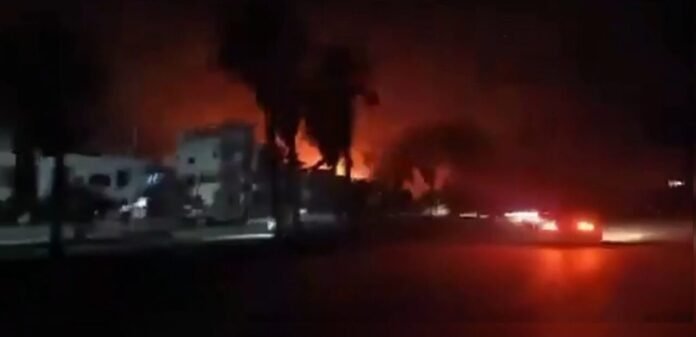Turkey’s military plans in Syria hit by Israeli strikes as both nations deny seeking direct conflict
Israeli airstrikes have obliterated several key airbases in Syria — locations Turkish forces had recently scouted for future deployment — intensifying regional tensions as Ankara eyes a defence pact with Syria’s new Islamist-led government.
Four sources familiar with the matter told Reuters that Turkish military teams had assessed at least three airfields in Homs and Hama provinces as part of Ankara’s preparations to secure a lasting military presence in post-Assad Syria. But those same sites — T-4, Palmyra, and Hama’s main airbase — were pummelled by Israeli jets this week, with the T-4 airfield reportedly rendered “totally unusable.”
“This was a tough message that Israel won’t tolerate Turkey expanding its footprint,” a regional intelligence official said. “They wiped out the tower, hangars, and even grounded aircraft.”
The strikes follow months of unease after Syrian rebels overthrew Bashar al-Assad in December and installed an Islamist government, which Turkey has swiftly embraced. Israel, alarmed by the ideological shift and Turkey’s potential entrenchment, has moved to block any Turkish military entrenchment near its borders.
Turkey insists its moves are purely defensive and not aimed at Israel. “We don’t want confrontation with Israel in Syria,” said Turkish Foreign Minister Hakan Fidan on Friday. “Syria belongs to Syrians.”
However, Israel isn’t convinced. A senior Israeli official, speaking during Prime Minister Netanyahu’s trip to Hungary, warned: “We don’t want conflict with Turkey, but we won’t allow them to set up military bases on our doorstep.”
The official underscored Israel’s “red lines,” referencing the threat of Turkey installing Russian-made air defences and drones at T-4 — a move Israel sees as a direct challenge to its air supremacy in the region.
The airstrikes were among the most intense since Assad’s ouster, with five separate Syrian sites struck within 30 minutes. According to Syria’s defence ministry, the Hama base was nearly obliterated, leaving dozens of soldiers and civilians wounded.
Though both governments are playing down the likelihood of direct conflict, analysts believe a broader ideological clash is underway.
“Turkey and Israel are on a collision course,” said Soner Cagaptay, an expert at the Washington Institute. “But the US could step in to de-escalate.”
Behind the scenes, Turkey has tried to ease American concerns. In recent meetings, Turkish officials told Washington that Syria’s new president, Ahmed al-Sharaa, poses no regional threat. They stressed that Turkey was carefully calibrating its pact with Damascus to avoid alienating the West.
Photos show Turkish officials being received by al-Sharaa, also known as Abu Mohammed al-Julani, in Damascus last December. Ankara has since been quietly coordinating visits to Syrian military installations, gauging their suitability for Turkish deployments.
A March 25 site visit to T-4 and Palmyra was abruptly cancelled after Israeli airstrikes hit the locations just hours earlier — a sign, say observers, that Israel is tracking Turkish movements closely.
Turkey’s ruling AK Party sees Syria’s stability as critical to its own security. “If Syria collapses again, we’ll suffer the most — with refugees and terrorism at our door,” one senior party official told Reuters.
Despite official denials, Turkey appears to be pushing for a strategic stake in Syria’s future, while Israel is using force to prevent any long-term Turkish entrenchment. Both countries say they want to avoid war — but for now, they remain on opposite sides of a shifting regional battlefield.
